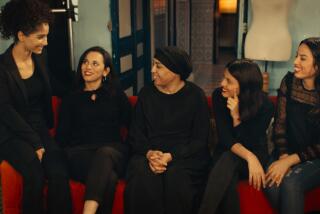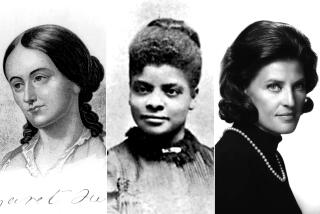Kuwait Women Resist Iraq, Seek Recognition of Role : Gulf crisis: Chants, posters and peaceful marches are their arms against invaders. Three have died so far.
JIDDA, Saudi Arabia â Instead of guns, their weapons are soft Arabic chants and posters of their beloved emir, Sheik Jabbar al Ahmed al Sabah. Their battlefields are the mosques and living rooms of Kuwait city. For armament against the Iraqi soldiers, they tote their children at their sides.
With most of the military leaders of the organized resistance now in hiding, the veiled, often-secretive women of Kuwait have become the most public leaders of the opposition, marching peacefully through the streets, organizing neighborhoods for civil defense and secretly carrying cash and supplies to the military resistance.
âAfter the invasion, the whole of Kuwait nearly froze. Nothing going on except telephone calls and tears and fears, and of course you hear all of these sounds of the military machines,â said a woman named Fatima, an organizer of the womenâs resistance who escaped from Kuwait only last week.
âWe felt it was our responsibility to break the ice. If somebody hits you on the head and you faint, you need somebody to splash cold water, to pat your cheeks to wake you up. I think at this particular moment this is the role of women in Kuwait,â she said.
Three women have been shot to death in public demonstrations so far. Others have been imprisoned and raped, according to reports from Kuwait, and still others have risked their families by secretly aiding the Kuwaiti resistance.
On Monday, Fatima made a step toward official recognition of womenâs role in the resistance effort, becoming the only woman to address the more than 1,000 Kuwaiti intellectuals, political leaders and businessmen who gathered in Saudi Arabia over the weekend to discuss the liberation of Kuwait and future political reforms.
Women do not have the right to vote in Kuwait. They do not attend the private diwaniyas, a kind of Kuwaiti menâs kaffeeklatsch, where important political issues are usually debated and decided.
Sheik Saad al Abdullah al Sabah, the crown prince and prime minister, has promised an expanded role for women in a liberated Kuwait. However, many women, angry at not being invited to participate in the Jidda talks, want to make certain that the pledge includes real, tangible political rights, such as the right to vote.
As she stood in front of the delegation in a closed session Monday, Fatima said, many men seemed to think the idea of womenâs political rights was a novel idea.
âEverybody thought it was new, just because the crown prince had mentioned it,â she said. âI told them this was not something new. Somebody asked me: âDid you think about all this before?â I said, âOf course, yes. For years.â â You know, I think they were listening.â
Kuwaiti women organized their first demonstration against the Iraqi occupation only three days after the Aug. 2 invasion, telephoning neighbors and calling them to a meeting at a centrally located mosque.
The meeting was to be limited to women and children. Fathers and sons who dropped off family members were instructed to leave immediately in the hope of avoiding a confrontation with Iraqi soldiers.
By 9 a.m., nearly 250 women had shown up, and they began praying for those killed in the invasion up to that point. Then, they began quietly marching down the street with posters of the emir and the crown prince, planning to go only a short distance. When Iraqi soldiers held back, the women made a circuit of the entire block.
Women arriving at a nearby grocery store got out of their cars and joined the demonstration. By noon, the crowd had swelled to 400.
âThat was quite a change,â Fatima said. âAnybody who was living in Kuwait could really feel it. Everyone had been afraid to leave their houses, and the next day, there were three times more cars on the streets because we broke the wall of fear.â
A short time later, they organized another demonstration at another mosque. Nearly 750 women participated. The demonstrations went on, erupting at one point into an angry confrontation with Iraqi soldiers that left three women dead.
And so, quietly, the women began a system of organizing neighborhoods, drawing up lists of doctors and pharmacists living in each region of Kuwait city, conducting first-aid training, showing women how to protect their families against chemical weapons, explaining how to store food and water supplies and manage electricity in the event of war.
A few women began publishing a newsletter, Al Kuwaitia (The Kuwaiti Woman), carrying documentation of the Kuwaiti resistance and news of the occupation based on reports from the British Broadcasting Corp. and the Voice of America. Women provided reports of resistance clashes based on what they had seen in their own neighborhoods.
They published 18 issues, at first daily, then every three days, until Iraqi soldiers began confiscating fax and photocopying machines and arresting people found with copies of the newsletter.
In recent weeks, as violent reprisals have forced members of the military resistance into hiding, Kuwaiti women have taken on the job of bringing food supplies to the resistance fighters and withdrawing cash for them from the banks.
For former policemen and soldiers who are no longer collecting government salaries, the women of the resistance have been contacting friends and collecting money. They also have been calling on Kuwaiti merchants, collecting rice, sugar and tea for the men in hiding.
Leaders of the military resistance who have left Kuwait said women are going so far as to carry weapons and give medical treatment to the resistance fighters. Some have become soldiers in the Kuwaitisâ mounting psychological warfare campaign as well.
âThey go up to the Iraqi soldiers and ask them, âWhy are you here? Why do you want to kill our people and destroy our country?â â said one former resistance fighter. The soldiers, he said, are usually âperplexed.â
Some Kuwaiti women, Fatima said, have been captured by Iraqi soldiers and sexually assaulted. Her nephew, held prisoner in a home occupied by Iraqi troops for several weeks, said he and several of his colleagues heard the weeping of women every night from a room nearby.
When the male prisoners were finally released, they saw the source of the crying: three Kuwaiti women huddled together in a room in their underwear. The men took off their long, white dishdashas and threw them at the women as they left. When the soldiers demanded to know why they had done this, her nephew told them: âBecause theyâre mine.â
âI donât know how to translate what this means,â Fatima said. âIt means they are my responsibility, they are my family, and it also has a sexual meaning, in a way,â she said. âHe was crying when he told me this.â
Fatima decided to drive out of Kuwait to the Saudi border city of Khafji last Tuesday after Iraqi soldiers surrounded and searched her home and began following her around Kuwait city.
She drove through Saudi Arabia as far south as Dammam before the religious police stopped her and reminded her that women are not allowed to drive in Saudi Arabia. She quietly complied--just as she did a few days later at the airport in Riyadh, the Saudi capital, when she was told that she was not allowed to have a glass of water in the main passenger lounge, but would have to go to the âfamilyâ lounge instead.
âIn Kuwait, I would put my finger in their eyes if anybody says anything like that,â she said. âIn Kuwait, we are allowed to sit in any coffee shop, anywhere. But we must be well-behaved guests. If I am invited to your house for lunch, I donât change my clothes and go into your bedroom.â
Still, some Kuwaiti women have expressed irritation that this past weekendâs conference on the future of Kuwait, which concluded Monday when a final communique was issued, was held in a place like Saudi Arabia, where joint meetings between men and women are forbidden.
In fact, a woman who identified herself only as Aicha sat boldly in the middle of the male delegates during Saturdayâs opening session, a silk veil demurely covering her head, and listened as the crown prince vowed: âThe Kuwaiti woman, whether she is a mother, a sister or a wife, has confirmed that she is equal to men and has participated fully in the resistance, rejecting the occupation. She has proven that she is equal to her brothers in Kuwait. I am quite confident that she will play a major role and contribute further in our future, freed Kuwait.â
Afterward, Aicha confessed that she sneaked into the conference disguised as a journalist but said she isnât sure if full political rights for women is a good idea.
âBefore, we had democracy between all the people in Kuwait. Now there will be more democracy for women,â she said. âBut we are an Islamic country, and we are an Arabic country. The women, we donât need to sit with men and talk, and we donât like to vote. When the men do it, itâs good for all of us. Everything we want, our prime minister will do for us.â
Fatima shrugged and said she fully expects that women will be elected to Kuwaitâs new national assembly after the liberation.
âDemocracy is something thatâs new for us,â she admitted, âbut as anything else in life, itâs always between high tide and low tide. So I think now we have quite a good future experience. It had got a little bit stuck. Now, itâs recovering. I think with this shock we will have a full, complete, bright democracy.â
More to Read
Sign up for Essential California
The most important California stories and recommendations in your inbox every morning.
You may occasionally receive promotional content from the Los Angeles Times.










